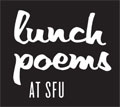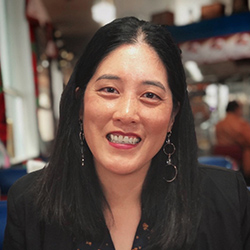Join Halifax poets Anna Quon, Nolan Natasha, and Annick MacAskill for a free online reading in celebration of poetry month. There will be a brief Q&A after the readings. This event is hosted by the Halifax Public Library and sponsored by the League of Canadian Poets.
Lunch Poems presents Jules Arita Koostachin & Annie Ross
Lunch Poems at Simon Fraser University (SFU) is a unique opportunity to celebrate poetry and is held the third Wednesday of every month, from 12 p.m. to 1 p.m. (Pacific).
April’s Lunch Poems reading features poets Jules Arita Koostachin and annie ross.
Poetry London Readings – Phil Hall
Poetry London is delighted to announce the readers for its upcoming 17th season!
Their three fall events will be video readings launched on their YouTube page; they hope that public health conditions will allow them to return to live events in 2021.
This event features poet Phil Hall.
How Poems Move in the Hospital
Curated by poet, physician and critic Shane Neilson, this event presents Adam Sol, Dominik Parisien and Moira MacDougall offering their poetry and poetry-related essays in this special Poetry Month/University of Toronto Health Humanities Event.
Language (from Obit)
Victoria Chang
copyright ©2020
Language—died, brilliant and beautiful
on August 1, 2009 at 2:46 p.m. Lover
of raising his hand, language lived
a full life of questioning. His favorite
was twisting what others said. His
favorite was to write the world in black
and white and then watch people try
and read the words in color. Letters
used to skim my father’s brain before
they let go. Now his words are blind.
Are pleated. Are the dispatcher, the
dispatches, and the receiver. When
my mother was dying, I made everyone
stand around the bed for what would
be the last group photo. Some of us
even smiled. Because dying lasts
forever until it stops. Someone said,
Take a few. Someone said, Say
cheese. Someone said, Thank you.
Language fails us. In the way that
breaking an arm means an arm’s bone
can break but the arm itself can’t break
off unless sawed or cut. My mother
couldn’t speak but her eyes were the
only ones that were wide open.
Notes on the Poem
Over the next few months, our Poem of the Week will feature works from the seven collections of the newly announced 2021 Griffin Poetry Prize shortlist. This week’s poem is from Victoria Chang’s deeply haunting collection, Obit—a series of surreal obituaries extending the definition of what can and can’t be mourned. Chang teaches us how to speak grief, a language in which the unsayable and the mundane coexis—a ghostly, yet deeply material syntax. Of Obit, the 2021 Griffin Poetry Prize judges say: “...Death is not something that happens to someone else—it is yours too, up close and personal, and deeply particular. It is not just a name or person or relation that dies—it is a frontal lobe, language inside the phone, the voicemail, the view and experience, the language they made or didn’t make, their sounds too...Every bit of a lived life gets a spot. In this book ‘grief takes many / forms, as tears or pinwheels...’‘dying lasts forever / until it stops’ and ‘our sadness is plural, but grief is / singular.” In this Rumpus interview, Chang discusses Obit Listen to her read from Obit Here
Alaska Quarterly Review Benefit Reading Series: Nicky Beer, Mary Peelen & Alexandra Teague
Help Alaska Quarterly Review (AQR) reach new literary milestones. Please mark your calendars for Pièces de Résistance, an extraordinary benefit series celebrating AQR’s 40th anniversary. Join the publication for 21 free, live online readings and conversations, featuring 58 exceptional new, emerging, and established poets and writers who have appeared in AQR. Pièces de Résistance runs from October 4, 2020 to May 2, 2021 hosted by the Anchorage Museum and moderated by author Heather Lende and AQR Co-Founder and Editor Ronald Spatz.
While all of the Pièces de Résistance events are free, consider making a tax-exempt donation to support AQR through our 501c3 affiliate, the Center for the Narrative & Lyric Arts.
This event features readings by Nicky Beer, Mary Peelen and Alexandra Teague.
Utah Poetry Festival (virtual)
Due to the COVID-19 pandemic, the 2021 Utah Poetry Festival will be virtual. Beginning Friday, April 16 and ending Sunday, April 18, 2021, the festival will feature poetry pedagogy roundtables, moderated conversations and public Q&A’s with poets from around the state, and two headline reading events.
The Utah Poetry Festival is hosted by Utah’s poet laureate, Paisley Rekdal, and is funded by fellowships and grants from The Academy of American Poets, Utah Division of Arts and Museums, and Utah Humanities.
2-Day Poem Contest registration deadline
This annual contest challenges you to write an original poem in 48 hours — with only one catch. The final poem must include ten words provided by CV2 Contemporary Verse 2 – The Canadian Journal of Poetry and Critical Writing. These words are released at midnight CDT on Friday April 23rd, 2021, leaving you 48 hours to use each of them at least once in an original poetry composition. Prizes include cash, publication, and a copy of the issue containing the winners, not to mention a whole weekend of wordy entertainment.
The Laurel Prize submission deadline
UK Poet Laureate Simon Armitage has established The Laurel Prize as an annual award for the best collection of nature or environmental poetry to highlight the climate crisis and raise awareness of the challenges and potential solutions at this critical point in our planet’s life. The Prize will dovetail and partner with The Ginkgo Prize which rewards best single poems.
In celebrating and rewarding this work, the Prize aims to encourage more of it, and to become part of the discourse and awareness about our current environmental predicament.
Virtual launch of Catherine Graham’s Æther
Poet Catherine Graham launches her latest work, Æther:An Out-of-Body Lyric, in conjunction with knife | fork | book, Wolsak and Wynn and Toronto Lit Up.



